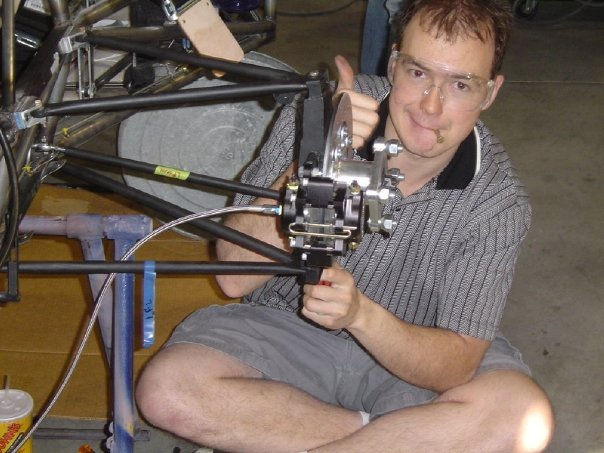My journey leaving corporate America for consulting
- Adam Witthauer

- Nov 5, 2025
- 9 min read
Updated: Nov 6, 2025
A lot of people were surprised at my decision to leave the corporate world. I was at a great company, led an amazing team, and had just cleared some very significant hurdles on the product my team supported. When I started we were a scrappy bunch with just over a dozen quality engineers with seemingly impossible qualification tasks, the two most infamous suppliers in the organization, and buried in quality escapes and overdue CARs. Three years later we had completed the impossible qualifications and had a realistic, achievable roadmap for all future qualification efforts, had the recipient of supplier of the year, no open quality escapes and were in the top 30% of the Division for CAR timeliness. We had fully shifted gears from struggling to keep our head above water to not only having everything under control, but having the luxury to shift our focus to strategic, systemic improvements.
Why would I want to leave this behind?
Humble beginnings
Back when I was finishing high school, I knew I wanted to be an engineer, but I liked mechanical, electrical, and computer things and couldn't really decide which of those three directions I wanted to go. While I was thinking about this, the local Navy recruiter started talking to me about the Navy Nuclear program. On one hand that should have made it clear to me that mechanical engineering was where I could meld all of these things, but on the other, when you're 17 and sold on traveling the world after the military gives you a mechanical engineering degree, filling out endless scholarship applications suddenly gets a lot less appealing.
Things didn't go as planned though. Right as I was about to schedule my appointment with MEPS (Military Entrance Processing Station), my recruiter said "hey, you wouldn't happen to be red-green colorblind, would you?" My response was "is that a problem?" That was the last I heard from him. The Army had tuition assistance, so when the Army recruiter called me the following week, I was probably his easiest sell of the year.
The funny thing is, the Army really doesn't have any better opportunities for the red-green colorblind than the Navy does. There are a handful of cool jobs that exist, but these were very rare and difficult to get into, no matter what your ASVAB line scores were. None of these happened to be available when I went to MEPS.
Doing a job I didn't want to do for 4 years was great character building at least and gave me time to decide that my next move was to the National Guard. I could still do cool Army things, but only part time, and I would actually have the time to go to college for mechanical engineering.
College
Starting college as a 22 year old non-traditional veteran student is probably the best preface to the professional career that followed. During my co-op with the Computer Aided Engineering (CAE) team at a major marine engine company, I learned about the wonderful world of engineering consultancy. The CAE team employed a few, and on top of this my roommate's dad was an experienced manufacturing engineer who was part of an engineering consultancy. After spending some time talking to him he had me sold on it, and I decided that once I got enough industry experience, this is something I aspired towards. My experience with the CAE group had me convinced that a PhD seemed like a good idea, and if nothing else it would probably help me as a consultant.
The National Guard provided additional leadership opportunities for me and I decided Officer School was the way to go. An added bonus was that Officers didn't have the same job code restrictions for red-green colorblindness. Instead of passing the infamous dot test, I only had to "be able distinguish red objects from green objects." How this was to be legally determined wasn't explicitly defined, but ultimately I paid an optometrist $150 to write a statement that I was able to tell a red marker from a green marker, and fulfilled this requirement. After 8 years enlisted service I commissioned as a second lieutenant in Field Artillery, which was a much better fit to what I wanted to do in the military.
Solopreneur, attempt 1
When I completed my PhD, I had no desire to enter the corporate world. My time at my co-op was fun and positive but just didn't seem to be what I wanted. I grew up with an entrepreneurial spirit and was absolutely willing to risk making no money for the chance of doing well and being in control of my own destiny.
During this time I was very active in racing, and actually had some designs for steering and suspension parts that filled the perfect hole in the market. It wasn't a huge market and there wasn't a lot of money in it, but I figured it was a good start. I had also saved enough money over multiple deployments that I had paid off my humble two bedroom house in Boone, Iowa, and could actually live off my National Guard weekend drill paychecks if I had to. Three months after getting my PhD I was well on my way with an innovative prototype steering rack that used aircraft control cables instead of a conventional rack and pinion.

After a few months a couple friends talked me into applying to the Fortune 500 Company they were working for. Great boss, great team, and it was a regional role; essentially an internal consulting role in the quality organization as a process expert supporting all of their plants in North and South America.
Enter corporate America
It was a bit of a unicorn opportunity in that this normally wouldn't be an entry level engineering position. Between my PhD and 14 years of military experience, I wouldn’t have accepted an entry level position anyway. Soon after taking my job I obtained a PMP certification based on my project experience during deployment and Formula SAE experience.
Things were going great, and about two years in I met the woman who would eventually become my wife. I had already lived in three states in that time and was just offered a nice promotion if I'd be willing to move to a fourth. I knew that if I turned this down I likely wouldn't find an opportunity like it anytime soon, even before my manager explicitly warned me of this. My future wife didn't have that kind of geographical mobility but would have supported a long-distance relationship, and the new location was only 4-5 hours away. What I knew in spending just two months with her was that this wasn't a compromise I should make.
A year later we got married and our life together has been amazing ever since. My corporate career, however, hadn't really gone further. I was ready to move up, but really my only opportunity for progression was to move to Ohio. Right after we got married I bought 40 acres and was planning on building our dream home, so now I was the one rejecting geographic mobility.
Finding another corporate job wasn't exactly straightforward. What role would best capitalize my experience as a PhD, PMP, and retired military officer? I've still never found the answer to that puzzle in a corporate setting, but fortunately I found a role where this combination of experience wasn't an over-qualification deal-breaker. Just after my 6th anniversary with the company I took a new role with a Fortune 100 defense prime contractor.
A change of pace
Things were going amazing. After 18 months I was promoted to Senior Engineer, and less than 6 months after that was offered a new role as manager over a new quality engineering department. It was a truly challenging role, but I built my team, built my culture, and after a couple years we went from being the biggest mess in the division to destroyers of systemic issues, consistently rocking the top 30% of KPIs across the board.
My team was simply powerful. We had a solid culture of trust and transparency. We struggled together in the beginning, grew as a team, and became inseparable. We were the winning team that everybody wanted to be on. In three years I only had two people submit resignations: one was just a couple months after I became manager, and one who chose to leave the corporate world to help out his grandparents on their farm. I didn't realize at that time that I wasn't far behind him.
Trouble in paradise

I was giving it all to get things in top shape with my department. Our last big round of qualification was the last big thing on our radar, which in itself was a rare sight. Things were finally calm and under control!
While I was giving 110% at work, it was costing me at home. Sundays turned into such a crash day that our church attendance suffered. We used to have some great family traditions: Friday nights we'd cook pizza together; Sunday afternoons we'd cook something out of our big fancy cookbook. We'd go to the park, visit family on the weekends, and do one "big" thing a month together. Eventually all of these things lapsed. One night I didn't get home until after the kids got to bed. The next day my 5-year-old told me "Daddy, you forgot to come home last night!"
Professionally speaking, the effort wasn't paying off either. I got plenty of praise in meetings, but none of this translated into anything tangible. The more I asked for feedback, the more vague it became. What useful feedback I could glean I implemented swiftly, and it was noticed and praised by others; all except for the one documenting my performance. The only thing that was clear in my career was that there was definitely a mold, and I definitely didn't fit it.
The business was also headed towards a tough time. President Trump stated publicly and repeatedly that he considered further investment into nuclear weapons a waste of money. As a contractor we were not subject to DOGE, but I knew that one day that contract would need renewed. I was in no position to know exactly what was coming, but I could sense that hard times were on the horizon (note: 3 months after my departure, this happened).
“the most improper job of any man, even saints (who at any rate were at least unwilling to take it on), is bossing other men. Not one in a million is fit for it, and least of all those who seek the opportunity.”
― J.R.R. Tolkien, The Letters of J.R.R. Tolkien
The biggest reason I never desired to join a large corporation was the politics. This isn't to say that politics don't exist in a smaller business; however large corporations are ruled by political tiers that simply don't exist in smaller businesses. Countless authors have written about how these levels of power tend to reward sociopathic behavior, and this idea is brought to common understanding through J.R.R. Tolkein's quote above. I will also add to this that this is a great demonstration on what servant leadership does different. This is the leadership style that has been taught in U.S. military officer school for at least the last two decades and also preferred by most HR professionals. However cultural inertia is a very real thing in corporate America, and this transformation will probably take many more years to become a norm (if it ever does).
What would Ferdinand Porsche do?
“I couldn't find the sports car of my dreams, so I built it myself”
― Ferdinand Porsche
A lot of people don't know that Porsche doesn't just build cars, they are also one of the leading consultancies in Germany. While they are mostly focused on the aerospace, automotive and shipbuilding industries, they were also responsible for making the legendary Harley V-Rod a reality. As a final plug for Porsche, if you are ever in Stuttgart you must see the Porsche museum. Seeing an electric traction motor from 1900, titanium crankshaft from the 1960s and a real-life 917 (Le Mans car, not much bigger than a golf cart with a boxer 12 crammed in it) gave me a whole new level of respect for the marque.
Leaving corporate America
I entered the corporate world 11 years before under the guise of "give it a shot, what's the worst that could happen?" I gave it a shot, and now I knew it was time to move on. Going on my own meant I could create a role for a Captain-Doctor-PMP, and I had no need for molds. The only reason I didn’t make it as a solopreneur the first time was because I got distracted and wandered astray. I’m not letting that happen again.

With the creation of Big W Engineering Solutions, I am leaving corporate America and making the same transformative impact I brought to Fortune 500 companies available to businesses of any size. My journey has been defined by leading teams through seemingly insurmountable challenges—turning underperforming departments into top-tier performers, building cultures of trust and transparency, and delivering measurable results where others saw only obstacles. From guiding a scrappy team of engineers to industry-leading success, to building and mentoring high-performing groups that consistently exceeded KPIs, my approach has always been rooted in servant leadership, strategic thinking, and a relentless drive for improvement.
Drawing on a unique blend of hands-on engineering expertise, military leadership, and project management experience, I have repeatedly demonstrated the ability to solve complex problems, implement sustainable systems, and inspire teams to achieve more than they thought possible. Now, through Big W Engineering Solutions, I am committed to bringing these proven methods and a passion for innovation to help your business achieve its own big wins.
Folks in suits often bemoan how gritty the real world of manufacturing is, but it is where I feel at home. I'll take picking chips out of my boots over a cubicle any day (another reason I wear cowboy boots...no laces to catch chips). We are entering a new American era in reshoring and innovation, and America has always run on small businesses. I can't wait to be part of your success!
Thanks for reading! If you found this helpful, feel free to share it with your network or reach out with your own engineering challenges. I’m always up for a good problem-solving chat.




Comments